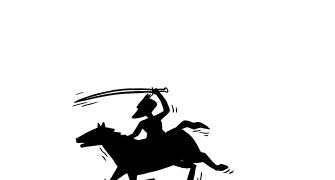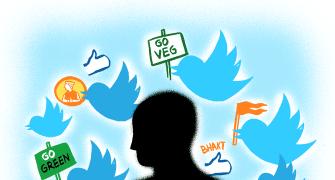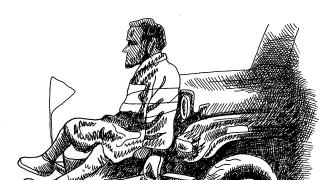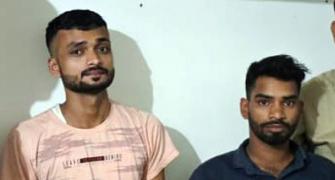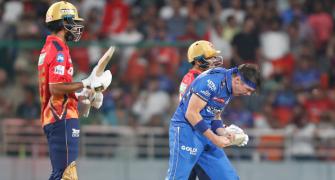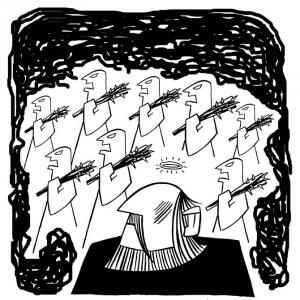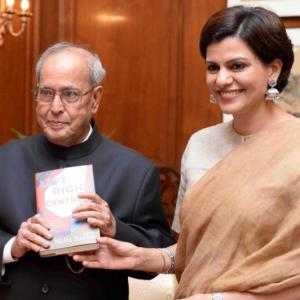Amit Malviya has been pilloried for allegedly threatening journalists, indulging in fake news and generally bringing a bad name to his party.
Archis Mohan reports.
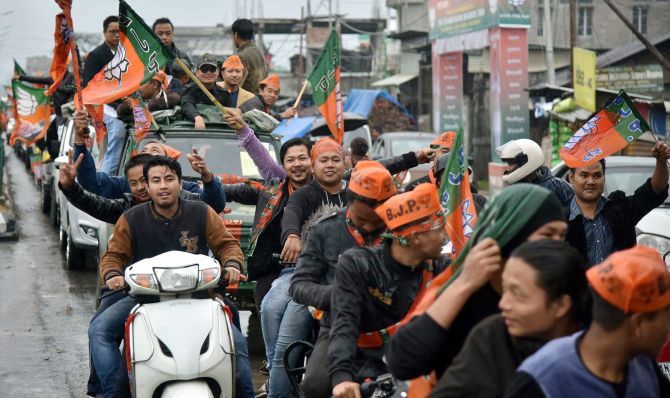
Amit Malviya, the chief of Bharatiya Janata Party's social media cell, is in the eye of a twitterstorm.
His tweets and statements subsequent to the murder of journalist Gauri Lankesh have brought much criticism at the doorstep of the mild-mannered former banker.
Malviya, left, has been pilloried for allegedly threatening journalists, indulging in fake news and generally bringing a bad name to his party.
Malviya's story to the top of the party's social media hierarchy and how it has become aggressive and vituperative under his watch is fascinating.
Towards the end of 2016, Sadhavi Khosla, a former member of BJP's digital cell, made public the alleged ugly side of the party's troll army.
She accused former IT cell chief Arvind Gupta of authorising the trolling of anyone who criticised the BJP and the Narendra Modi government.
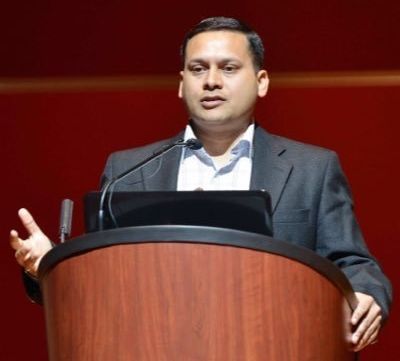 Among Khosla's allegations, published in a book by journalist Swati Chaturvedi, was that the Gupta-led social media team handled at least 20 WhatsApp groups, subdivided on the basis of gender and age group 'to spread filth, lies and misinformation'.
Among Khosla's allegations, published in a book by journalist Swati Chaturvedi, was that the Gupta-led social media team handled at least 20 WhatsApp groups, subdivided on the basis of gender and age group 'to spread filth, lies and misinformation'.
Gupta, who by mid-2015 had found himself replaced by a much younger Malviya, claimed Khosla was never a member of the team.
He said the BJP 'never encouraged trolling'. But under much media scrutiny, Gupta admitted in an interview that he had not 'directly supervised social media activities since 2015 when the party structure was reorganised'.
Party chief Amit Shah brought in several changes in the party organisation within months of being elected as president for a three-year term in 2015.
This included replacing Gupta with Malviya.
Now in the government and receiving flak for failing to deliver on its election promises, losing assembly polls in Delhi and Bihar, criticised for 'intolerance', the BJP, by the end of 2015, needed a social media strategy different from the one it had pursued to build a positive narrative around Modi in 2014.
A speech by Malviya at a seminar organised by the India Foundation offers a glimpse into his strategy.
At India Foundation's '5th Young Thinkers' Meet' at Patnitop in Jammu in August 2016, Malviya moderated a discussion on the 'Role of Social Media: Construction and Manipulation of Dominant Narratives'.
In the speech, a gist of which is available on the India Foundation Web site (www.indiafoundation.in/5th-young-thinkers-meet-2016/), Malviya said that 'from the BJP's perspective, in the next two years, governance would continue to be the key'.
Significantly, according to the Web site, Malviya said 'the party would also closely work with many unaffiliated groups and mediums to increase outreach and awareness about issues'.
Malviya came into his own in the run-up to and after the 2017 Uttar Pradesh election results.
The UP digital campaign was helped since Malviya knew the territory, having lived in Allahabad and studied in Agra.
WhatsApp group messages from unaffiliated groups were the spine of the Sangh Parivar's social media strategy for these polls.
While he did not respond to a request to speak for this article, Malviya has in recent times become more accessible to journalists.
He is written about more often in the mainstream media and regularly addresses press conferences and has been on studio discussions as his party's representative.
Malviya's social media presence, in the context of recent controversies, might give an impression of him being an intemperate man, and an ambitious one who can go to vituperative extremes to browbeat critics of his party's policies and its leadership. But Malviya remains a soft-spoken person.
"He is an archetypal backroom boy, and revels when he is trusted by his bosses, but is faceless to the public. This controversy has pushed him into public glare where he has had to take positions, which must be a new experience from him," says a former associate who does not want to be named and who now works with a social media team of an Opposition party.
Malviya is clearly trying to reinvent himself into a BJP spokesperson, and follow in the footsteps of successful spokespersons such as Arun Jaitley and Piyush Goyal.
But if the likes of Jaitley and Goyal are admired for their reasonableness, Malviya now has an image of a provocateur.
Subsequent to the criticism that Prime Minister Modi follows a Twitter handle that abused those who protested Lankesh's murder, Malviya put forth a statement that stood out for its brazenness.
Malviya went on to provide a twisted defence of how Modi has never unfollowed or blocked anybody, and that he also follows Congress Vice-President Rahul Gandhi and Delhi Chief Minister Arvind Kejriwal, one of whom is 'an accused of loot and fraud' and the other is someone who has abused Modi on Twitter.
A senior party leader said the statement was poorly drafted.
Soon, several articles that termed Malviya a 'liability' (external link) for his party and instances of him indulging in fake news and misinformation surfaced.
In the midst of this, Malviya further riled journalists with a tweet on how BJP youth leader Tajinder Pal Singh Bagga has filed a defamation case against Chaturvedi, the journalist.
In November 2016, when a judicial magistrate convicted Lankesh in a defamation case against BJP Karnataka leader Prahlad Joshi, Malviya had tweeted: 'Prahlad Joshi, BJP MP from Dharwad, gets Gauri Lankesh convicted in a defamation case.'
The tweet ended with a dire warning. 'Hope other journos take note.'
Malviya comes from a middle-income family. According to his LinkedIn profile, he completed his bachelor of business management from Agra in 1998 and received a post-graduate diploma in management from Symbiosis Institute of Management Studies in Pune.
He then moved to Mumbai to work as a banker for ICICI Bank and HSBC, among others, and was with the Bank of America in Bengaluru from 2010 to 2012.
His Facebook posts of until 2010 paint a picture of a man devoted to his family and a keen traveller.
During his Mumbai stint, Malviya impressed some of the BJP's senior leaders, particularly Goyal, who was then the party treasurer and had worked out the party's social media outreach in the run-up to the 2009 Lok Sabha polls.
It was called 'Friends of BJP' and exhorted the 'non-voting middle-class' to go out and cast their ballot.
This was before the Twitter and WhatsApp era, and BJP relied on text messages, Orkut and Facebook to reach out to potential voters.
That Lok Sabha campaign failed for the BJP, but it helped the party identify young leaders who would form the core of its social media team when it started preparing for the 2014 Lok Sabha elections under Modi's leadership.
After several successes, Malviya is now in uncharted territory.
The Opposition has become social-media savvy. The Modi government is increasingly being questioned, particularly on WhatsApp, on the state of the country's economy.
The work Malviya does is under the scanner. It would be interesting to see if he succeeds in reinventing himself or ends up earning more criticism for his social media strategy.
That criticism is only bound to get shriller with the BJP hoping to rely on its core ideological issues, like the Ram Janmabhoomi, to win the 2019 Lok Sabha election.
Amit Malviya's pPhotograph: Kind courtesy @malviyamit/Twitter


